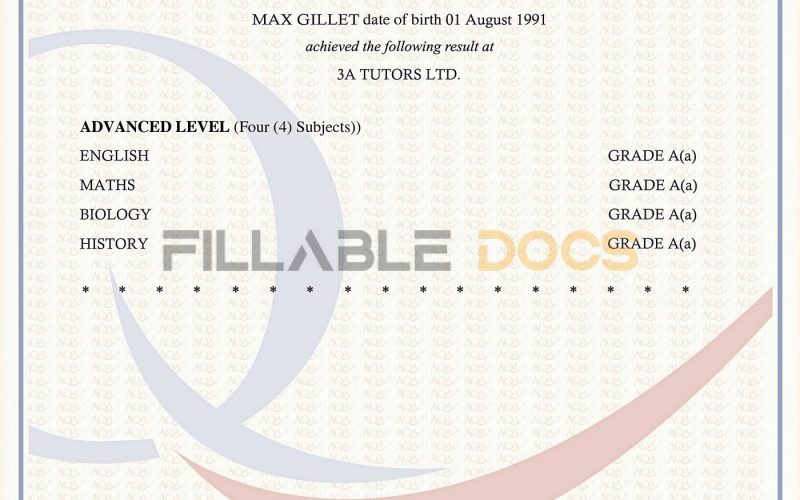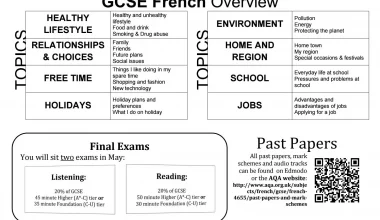Congratulations on smashing your GCSE. Now, you must probably be wondering “When do you get GCSE certificates?” and what happens after it? That’s normal!
Various milestones mark the journey through secondary education, and one of the most awaited is the moment when you finally receive your GCSE certificate. This small piece of paper represents years of hard work, dedication, and countless hours of studying.
In this article, we will discuss the significance of this achievement, exploring the impact it has on your educational path and future endeavors. From the anticipation leading up to results day to the doors it opens for further education and career opportunities, the GCSE certificate holds a special place in every student’s life.”
Table of contents
- When Do You Get GCSE Certificates?
- How Long Do Schools Keep GCSE Certificates?
- Can The GCSE Certificates Be Replaced if Lost?
- What Events Are Organized For Students When They Receive GCSE Certificates?
- What Information Are Included in The GCSE Certificate?
- What are the Benefits of Getting Your GCSE Certificate?
- FAQs
When Do You Get GCSE Certificates?
That official certificate with your grades on it? Hold on, these things don’t work like magic! There’s usually a wait after your exams.
Now, after your exams, your school will receive the certificates from the exam boards. This usually takes about three months after the results day.
That means you can expect to get your GCSE certificates in November – that is if results day falls in August.
You may wonder why it takes this long and by whom. It’s because the timeframe before the certificates are sent out allows for any remarks or appeals to be processed before you receive the final version of your grades.
Wait, you didn’t think you could get your GCSE remarked? That’s possible. This usually happens when you notice there’s been a suspected marking error or an inconsistency in marking your scripts. And yes, you can request to see your marked script, too.
Read: How to Find GCSE Results Online | What To Do If You Have Lost Your GCSE Certificates
How Long Do Schools Keep GCSE Certificates?
After completing the GCSE exams, students eagerly await the arrival of their certificates, which serve as tangible evidence of their academic achievements.
The timeline for receiving GCSE certificates can vary depending on several factors, including the examination board, the school’s administrative processes, and the time of year the exams were taken.
In general, the timeline for receiving GCSE certificates falls within a few months after the exam results are released.
The entire process involves multiple steps, including marking, moderation, grade determination, and finalization of results. Once these processes are completed, the examination boards generate the certificates and send them to the respective schools.
Also, read: Can You Retake Your GCSEs At Any Age?
Here’s a breakdown of the typical timeline
- Examination Period: GCSE exams are usually held in May and June. After the exams are completed, the examination papers are collected and sent for marking.
- Marking and Moderation: The marking process can take several weeks, as examiners meticulously assess the papers to determine the grades. Additionally, there might be a moderation process to ensure consistency and fairness in grading across different schools.
- Grade Determination: Once the marking and moderation processes are complete, the examination boards determine the final grades for each student. This involves analyzing the marks achieved and applying any grade boundaries that have been set.
- Results Day: GCSE results are typically released in August. On this day, students receive their subject grades and overall results. The grades are usually given as letter grades (A*, A, B, C, etc.) or numerical grades (9 to 1, with 9 being the highest).
- Certificate Generation: After the results are released, the examination boards initiate the process of generating GCSE certificates. This involves compiling the student’s information, including personal details and subject grades.
- Certificate Dispatch: Once the certificates are generated, they are sent to the respective schools. Schools are responsible for distributing the certificates to their students. The time it takes for the certificates to reach the schools can vary based on the efficiency of the postal system and the examination board’s internal processes.
- School Administrative Processes: Upon receiving the certificates, schools might need time to organize the distribution process. They may choose to hold a certificate presentation event or distribute the certificates during a school assembly.
- Student Receipt: Students typically receive their GCSE certificates from their school sometime between October and December. The exact timing can vary from school to school.
Also, read this: What is an Undergraduate Degree? Meaning, Requirements, Costs, and Best Schools
Can The GCSE Certificates Be Replaced if Lost?
Certainly, if your original GCSE certificate is lost, damaged, or misplaced, you can usually request a replacement copy from the examination board that issued the certificate. Here’s how the process generally works:
- Contact the Examination Board: The first step is to get in touch with the examination board responsible for issuing your GCSE certificate. This information is often available on the examination results slip you received from your school.
- Fill Out the Application Form: Examination boards typically require you to complete an application form for a replacement certificate. This form will likely ask for details such as your personal information (name, date of birth, etc.), the year you took the exams, the subjects you were examined in, and any identification numbers you might have been assigned.
- Provide Proof of Identity: To ensure security and prevent fraudulent requests, examination boards may require you to provide proof of your identity. This could involve sending copies of your passport, driver’s license, or other official identification documents.
- Pay the Replacement Fee: There is usually a fee associated with requesting a replacement certificate. The cost can vary depending on the examination board and the urgency of your request. Be prepared to include payment with your application.
- Wait for Processing: Once you’ve submitted the application form, required documents, and payment, you’ll need to wait for the examination board to process your request. The processing time can vary, but it’s a good idea to allow several weeks for this.
- Delivery of Replacement Certificate: Once your application has been processed, the examination board will send you a replacement GCSE certificate. This certificate will serve as valid proof of your academic achievements, just like the original.
- Note the “Certified Copy”: Replacement certificates are often marked as “Certified Copy” to indicate that they are not the original, but they are still official and valid proof of your achievement.
It’s important to remember that the process might have slight variations depending on the examination board you are dealing with, so be sure to check their specific guidelines and requirements.
Additionally, if you’re requesting a replacement certificate from exams taken a long time ago, the process might take longer, and certain details might be harder to retrieve.
Related article: How to Revise For A-Level English Literature?
How do Universities View GCSE Certificates During the Application
GCSE certificates hold a significant place in the university application process as they provide valuable insights into a student’s academic performance and capabilities.
Here’s how universities typically view GCSE certificates during the application process:
- Assessment of Academic Foundation: GCSEs serve as a foundational assessment of a student’s academic abilities. They showcase a candidate’s performance across a range of subjects and provide universities with an understanding of their aptitude and potential.
- Subject Relevance: Universities often look closely at the subjects a student has studied at the GCSE level. This is particularly important for degree programs that require specific prerequisites or foundational knowledge in certain subjects. For example, a student applying for a science-related course might be expected to have strong GCSE grades in relevant science subjects.
- Benchmark for Comparison: GCSE grades offer a standardized benchmark for universities to compare applicants from different schools and regions. They provide a common basis for evaluating academic achievement, especially since teaching and grading practices can vary across institutions.
- Academic Consistency: Universities consider GCSE grades as part of a student’s overall academic history. Consistency in performance across subjects and over the years can demonstrate a student’s dedication and work ethic, which are qualities highly valued in higher education.
- Predictive Value: Research has shown a correlation between GCSE performance and success at the university level. While GCSEs aren’t the sole predictor of university success, they can indicate how well a student might adapt to the demands of higher education.
- Offer Conditions: For many university offers, there are often specific GCSE grade requirements that applicants must meet. These conditions might be set for individual subjects or as a cumulative requirement. Meeting these conditions is essential to secure a place in the desired degree program.
- Competitive Admissions: Strong GCSE grades can set applicants apart from the competition in courses with high demand and limited spots. Excellent GCSE results can enhance an applicant’s chances of receiving an offer, especially when universities are looking for top-tier candidates.
- Personal Statements and References: GCSE grades can also play a role in the personal statement and references included in the application. They can be used to highlight a student’s academic achievements, interests, and motivations.
- Flexibility in Subject Choice: Some universities may consider a broader range of subjects and not solely focus on those directly related to the chosen course. This allows students to showcase their diverse skills and interests.
- Contextual Admissions: Some universities practice contextual admissions, taking into account the educational background and challenges faced by applicants. In such cases, GCSE grades may be considered alongside other factors to provide a more holistic view of the applicant.
See also: What is a Student Certificate? How Do Acquire One Easily?
What Events Are Organized For Students When They Receive GCSE Certificates?
Many schools organize special events or ceremonies to celebrate students’ achievements when they receive their GCSE certificates.
These events mark the culmination of years of hard work and dedication, providing an opportunity for students, teachers, and families to come together and recognize the students’ accomplishments.
While the nature of these events can vary from school to school, here are some common ways in which GCSE certificate presentation events are organized:
- Certificate Presentation Ceremony: Some schools host formal certificate presentation ceremonies, often held in a school auditorium, hall, or local community center. During the ceremony, students are called up one by one to receive their certificates, which are usually handed out by a teacher or school administrator. This formal setting allows for a sense of accomplishment and recognition.
- Guest Speakers: Some schools invite guest speakers, such as alumni who have gone on to achieve success in their careers or other prominent figures, to share words of wisdom and inspiration with the graduating students. These speakers can provide valuable insights into the journey ahead and the opportunities that await.
- Dress Code: Depending on the school’s tradition, students might be asked to dress formally for the occasion. This adds to the sense of importance and respect surrounding the event.
- Awards and Special Recognitions: In addition to the GCSE certificates, schools might also present awards for specific achievements, such as academic excellence in certain subjects or outstanding contributions to school life. These additional recognitions highlight students’ diverse talents and efforts.
- Music and Performances: To add a festive atmosphere, some events include musical performances, dance routines, or other artistic displays presented by students. These performances can enhance the celebratory mood of the occasion.
- Parent and Family Involvement: Parents and family members are often invited to attend the ceremony to share in the celebration. This allows them to witness their children’s accomplishments and offer their support and encouragement.
- Reception or Refreshments: After the ceremony, some schools host a reception or provide refreshments, allowing attendees to mingle, take photos, and congratulate one another in a more relaxed setting.
- Decorations and Atmosphere: Schools may decorate the venue with banners, flags, and displays that reflect the school’s colors, crest, and motto. This creates a visually appealing environment that adds to the sense of occasion.
- Graduation Attire: Some schools ask students to wear graduation gowns or caps during the ceremony, which further adds to the formal and celebratory atmosphere.
- Photo Opportunities: Schools often provide opportunities for students and their families to take photographs with friends, teachers, and their certificates. These moments can become cherished memories captured on camera.
Read also: Does Oxford University Have Uniform? Oxford Clothing Traditions and Their History.
What Information Are Included in The GCSE Certificate?
A GCSE certificate is a formal document that provides a comprehensive summary of a student’s achievements in their General Certificate of Secondary Education (GCSE) exams.
It contains important information that reflects the student’s academic accomplishments and serves as an official record of their performance.
Here’s a breakdown of the information typically included on a GCSE certificate and how it reflects the student’s achievements:
- Personal Information: The certificate will display the student’s full name, date of birth, and, in some cases, a unique candidate number. This personal information serves to uniquely identify the student and ensure the certificate corresponds to the correct individual.
- School Information: The certificate may feature the name and address of the school or institution where the exams were taken. This information provides context about the educational environment in which the student achieved their results.
- Examination Board: The name of the examination board that administered the exams will be prominently displayed. This indicates the organization responsible for assessing and awarding the grades.
- Subject Names and Grades: The certificate will list all the subjects the student was examined in, along with the corresponding grades. Each grade represents the student’s performance in that specific subject, ranging from the highest (e.g., A* or 9) to the lowest (e.g., G or 1).
- Qualification Title: The overall qualification title, “General Certificate of Secondary Education,” will be stated on the certificate. This title reflects the level and nature of the qualification attained by the student.
- Date of Issue: The date on which the certificate was issued is included. This date signifies the official recognition of the student’s achievements.
- Authentication and Signatures: The certificate may include authentication marks, holograms, or other security features to ensure its legitimacy. It might also include signatures of authorized individuals, such as school officials or representatives from the examination board.
- Qualification Code: Each GCSE subject and qualification has a unique code. These codes are used for administrative and reference purposes, helping to accurately identify the subjects taken.
- Cumulative Points or Grades: Some certificates provide additional information, such as the total points or grade points achieved across all subjects. This can be particularly useful for individuals or institutions that use points-based systems for admissions or recognition.
Also, read: Are GCSEs Important for Jobs? How Important Are GCSEs (To Universities, Employers, And Colleges)
What are the Benefits of Getting Your GCSE Certificate?
There are so many benefits to getting this certification even after having seen your results released by the exam board. Here are the things it shows:
- Subject Proficiency: The individual subject grades indicate the student’s level of proficiency in specific areas of study. Higher grades reflect a deeper understanding of the subject matter.
- Overall Performance: The combination of subject grades gives an overview of the student’s overall performance across a range of subjects. This helps universities and employers gauge the breadth of the student’s knowledge and skills.
- Recognition of Effort: Achieving strong grades on a GCSE certificate demonstrates the effort, dedication, and hard work the students put into their studies.
- Basis for Further Study: GCSE grades can influence the student’s options for future education and career paths. High grades can open doors to advanced study opportunities and specialized courses.
- Measurement of Progress: The certificate serves as a tangible record of the student’s academic progress, marking a significant milestone in their educational journey.
Related article: What is an AS Levels? Everything You Need To Know About The AS Levels
FAQs
A GCSE certificate is an official document that confirms a student’s grades and achievements in the General Certificate of Secondary Education exams.
A GCSE certificate includes the student’s name, date of birth, school information, examination board details, subject names, corresponding grades, qualification title, and date of issue.
A GCSE certificate is important as it reflects a student’s academic performance, providing evidence of their achievements and serving as a qualification for further education and employment.
Yes, you can request a replacement GCSE certificate if the original is lost, damaged, or misplaced. Contact the examination board for the application process.
Universities view GCSE certificates as a basis for assessing a student’s academic foundation, subject relevance, consistency, and potential to succeed in higher education. They may also set grade requirements for specific courses.
Conclusion
Retaining your GCSE certificates for a lifetime is recommended. These documents hold valuable information about your academic achievements and can be useful for future education, employment, and personal records.
References
- dailymail.co.uk: When do you get GCSE certificates?
- goodto.com: When do you get GCSE certificates?






